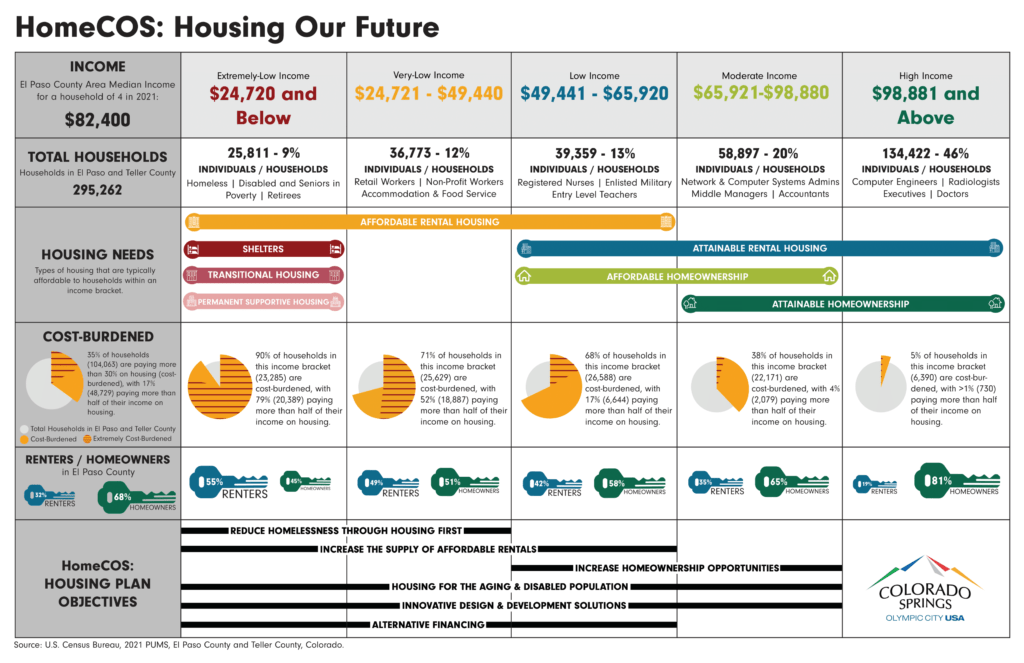Randy Scott and his wife, BJ, have a lengthy history of serving the Pikes Peak region through their work with nonprofit organizations, tackling subjects like homelessness, health, and aging, as well as consulting with nonprofits on management and governance. They found multiple organizations were addressing various aspects of the affordable housing crisis, but no entity was solely focused on finding and implementing solutions, Randy Scott says.
The Affordable Housing Collaborative (AHC), which the Scotts helped to form in 2018, and the Community Affordability Task Force came closest. The AHC was doing research and bringing together developers, philanthropists, and other interested people.
“There were a lot of meetings going on, but not many solutions were being identified,” Scott says. The AHC created a website to post information, made data-driven educational presentations to the community, and held two community assemblies; they also spoke at City Council meetings where legislation concerning accessory dwelling units and zoning changes occurred, to encourage affordable housing was being considered.
In April 2022, the AHC issued a report called “Housing for All: Solutions That Make Sense,” which contained a detailed action plan on addressing the affordable housing problem.
“Our problem was — we’re a bunch of volunteers — we’ve got other things, jobs, etc., or we’re running organizations,” he says. After some additional research into what other cities were doing, the Scotts started fundraising to form a new organization that would serve as a professional affordable housing ombudsman.
“The Affordable Housing Collaborative, which is volunteer-driven, is now becoming the Pikes Peak Housing Network, which will be staff-driven,” Scott says. The Colorado Springs Chamber & EDC is hosting the new organization and acting as its fiscal agent. A board of directors has been recruited, and candidates for an executive director are being interviewed. Scott expects the selection will be announced within a few weeks.

Finding solutions
The Pikes Peak Housing Network’s mission is to “foster or identify innovative and collaborative solutions to this problem and try to pull the right people together that can implement those solutions,” Scott says.
Because the causes of the affordable housing crisis are complex, ranging from the negative perception of affordable housing to the escalating costs of building and home purchase, there is no silver bullet solution, he says.
“We’ve got to have more housing, and it’s got to be at all levels,” he says, including apartments, condos, and single-family homes. “And we’re unfortunately going to have to probably go to more density to utilize our land better and to help bring some of those costs down. So there’s a lot of different avenues that have to be looked at and have to be worked on by various sectors of the community in order to ultimately solve this problem.”
Affordable Housing by the Numbers
People often think of affordable housing as large public complexes where very poor people live, but it is far more nuanced than that, Scott says. Nationwide, according to a Dec. 8, 2022, estimate by the U.S. Census Bureau, more than 40% of renters were “cost burdened,” meaning they were spending more than 30% of their income on housing costs.
Local statistics compiled by the city of Colorado Springs from 2021 Census Bureau Data showed that 35 percent of households in El Paso and Teller counties were cost-burdened, and 17% were extremely cost-burdened — that is, they were paying more than half their income for housing.
And while 90% of households in the lowest income bracket — making $24,720 per year or less — are considered cost-burdened, even higher income brackets feel the pinch. The Collaborative terms this the missing middle — households with incomes from about $25,000 to over $65,000.
“You’ve almost got to be making $70,000 a year to be able to afford an apartment here,” Scott says. “It’s now affecting job types that would never have been considered having problems being able to pay rent before. We’re talking about retail workers and nonprofit workers and people working in the service industry; we’re even talking about registered nurses, enlisted military and teachers.”











